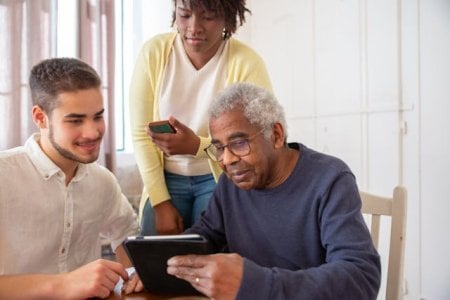Discover the Secret to Happiness: Why More Older Adults Are Turning to Volunteering!
By
Seia Ibanez
- Replies 6
As we age, our lives undergo significant transformations. Retirement, children leaving the nest, and the loss of loved ones can leave us with a newfound abundance of time and, occasionally, a sense of searching for what comes next. For many, like 64-year-old Amy Laskey, this period of life has become an opportunity to engage in volunteering, an activity that is proving to be more than just a pastime—it's a gateway to happiness and health for older adults.
Amy's journey into the world of volunteering began after retirement and the passing of a parent. With her son grown up and her full-time career in municipal finance behind her, she found herself with time to spare. Amy chose to fill that time by giving back to her community in New York City. From assisting in ESL classes to ushering at classical music venues and writing letters to incarcerated individuals, Amy's volunteer work has brought her a sense of fulfillment that was different from her professional and familial roles.
The trend of older adults dominating the volunteering space is not unique to Amy. According to the US Bureau of Labor Statistics, those aged 65 and older are two to three times more likely to volunteer than their younger counterparts aged 25 to 34. This is often because older adults typically have more free time to dedicate to causes that are not directly related to work or immediate family responsibilities.
But the benefits of volunteering extend far beyond filling time. A growing body of research indicates that maintaining a sense of purpose and meaning in life through volunteering can have a profound impact on the physical and mental health of older adults. This is particularly important as issues of loneliness and health often become more pronounced in old age.
For Amy, one of the most significant rewards of volunteering is the diverse range of people it brings her into contact with—people she might never have met otherwise. It's a sentiment echoed by Philip Yates, a 61-year-old retiree in Peterborough, Ontario, who volunteers to drive elders to medical appointments. Through these drives, Philip has not only learned more about his neighborhood but has also been reminded of his good fortune, keeping him grateful and grounded.
The sense of usefulness and responsibility that comes with volunteering contributes to a sense of purpose, which Eric Kim, an assistant professor of psychology at the University of British Columbia, identifies as a critical yet often overlooked aspect of wellbeing. A strong sense of purpose is linked to resilience, reduced risks of heart attacks and strokes, better grip strength, faster walking speed, and even slower biological aging.
However, finding the right volunteer opportunity is key to reaping these benefits. A mismatched position can lead to dissatisfaction, much like in a job. The good news is that there are countless organisations in need of volunteers, offering a variety of roles to suit different interests and abilities.
For those looking to volunteer, Amy suggests trying out different activities to see what resonates with you. Use your knowledge or expertise to guide you, and don't be afraid to reach out to local organisations to explore opportunities. Starting with a low-commitment option, like helping at a one-day event, can be a great way to test the waters.
Volunteering can center around hobbies, cultural, religious, or LGBTQ+ identities, or simply be a way to contribute to the community in a meaningful way. Local libraries and organisations like the AARP can connect you with volunteer opportunities, and bringing a friend or family member along can make the experience even more enjoyable.

The secret to happiness in our later years may very well lie in the act of giving back. As Atalaya Sergi, national director of AmeriCorps Seniors, puts it, 'Whatever your background is, no matter where you’ve come from or what you’ve come through, no matter your education level, you have something to give that your community needs.' For older adults across Australia and beyond, volunteering is not just a way to pass the time—it's a path to a richer, more connected, and healthier life.
Amy's journey into the world of volunteering began after retirement and the passing of a parent. With her son grown up and her full-time career in municipal finance behind her, she found herself with time to spare. Amy chose to fill that time by giving back to her community in New York City. From assisting in ESL classes to ushering at classical music venues and writing letters to incarcerated individuals, Amy's volunteer work has brought her a sense of fulfillment that was different from her professional and familial roles.
The trend of older adults dominating the volunteering space is not unique to Amy. According to the US Bureau of Labor Statistics, those aged 65 and older are two to three times more likely to volunteer than their younger counterparts aged 25 to 34. This is often because older adults typically have more free time to dedicate to causes that are not directly related to work or immediate family responsibilities.
But the benefits of volunteering extend far beyond filling time. A growing body of research indicates that maintaining a sense of purpose and meaning in life through volunteering can have a profound impact on the physical and mental health of older adults. This is particularly important as issues of loneliness and health often become more pronounced in old age.
For Amy, one of the most significant rewards of volunteering is the diverse range of people it brings her into contact with—people she might never have met otherwise. It's a sentiment echoed by Philip Yates, a 61-year-old retiree in Peterborough, Ontario, who volunteers to drive elders to medical appointments. Through these drives, Philip has not only learned more about his neighborhood but has also been reminded of his good fortune, keeping him grateful and grounded.
The sense of usefulness and responsibility that comes with volunteering contributes to a sense of purpose, which Eric Kim, an assistant professor of psychology at the University of British Columbia, identifies as a critical yet often overlooked aspect of wellbeing. A strong sense of purpose is linked to resilience, reduced risks of heart attacks and strokes, better grip strength, faster walking speed, and even slower biological aging.
However, finding the right volunteer opportunity is key to reaping these benefits. A mismatched position can lead to dissatisfaction, much like in a job. The good news is that there are countless organisations in need of volunteers, offering a variety of roles to suit different interests and abilities.
For those looking to volunteer, Amy suggests trying out different activities to see what resonates with you. Use your knowledge or expertise to guide you, and don't be afraid to reach out to local organisations to explore opportunities. Starting with a low-commitment option, like helping at a one-day event, can be a great way to test the waters.
Volunteering can center around hobbies, cultural, religious, or LGBTQ+ identities, or simply be a way to contribute to the community in a meaningful way. Local libraries and organisations like the AARP can connect you with volunteer opportunities, and bringing a friend or family member along can make the experience even more enjoyable.
Key Takeaways
- Older adults, like 64-year-old Amy Laskey, are more likely than younger adults to have the time to volunteer and often engage in a variety of activities which can lead to part-time employment.
- Volunteering provides older adults with physical and mental health benefits, contributing to a sense of purpose, reducing feelings of isolation, and potentially improving overall well-being.
- Research suggests that older adults who volunteer regularly may experience reduced risks of heart attacks, strokes, and high blood pressure, as well as slower biological ageing.
- It is important for older adults to find volunteer opportunities that are a good fit for them, as this maximises the benefits and ensures that any experience remains positive and fulfilling.
The secret to happiness in our later years may very well lie in the act of giving back. As Atalaya Sergi, national director of AmeriCorps Seniors, puts it, 'Whatever your background is, no matter where you’ve come from or what you’ve come through, no matter your education level, you have something to give that your community needs.' For older adults across Australia and beyond, volunteering is not just a way to pass the time—it's a path to a richer, more connected, and healthier life.








